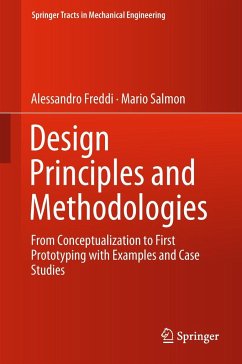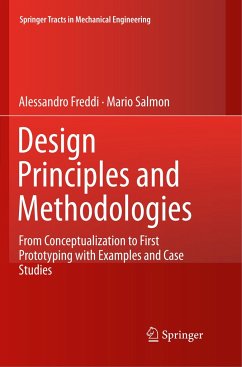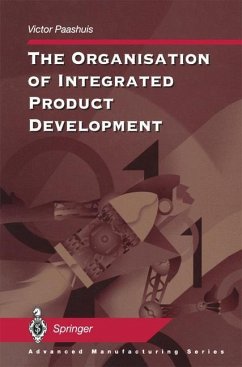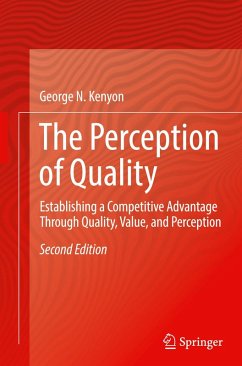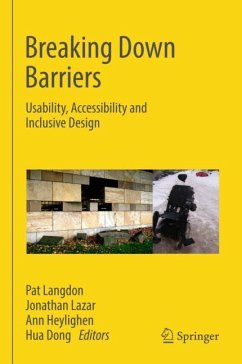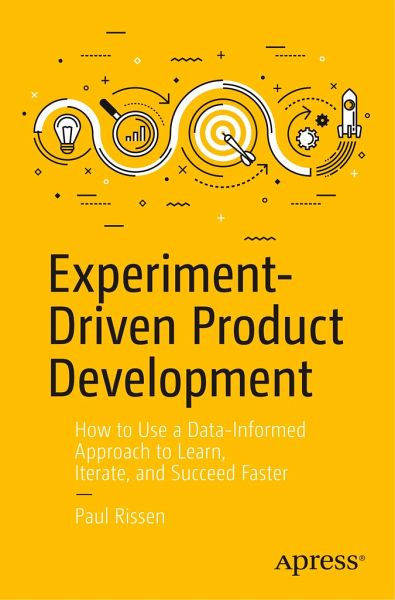
Experiment-Driven Product Development
How to Use a Data-Informed Approach to Learn, Iterate, and Succeed Faster

PAYBACK Punkte
16 °P sammeln!
Improving your craft is a key skill for product and user experience professionals working in the digital era. There are many established methods of product development to inspire and focus teams-Sprint, Lean, Agile, Kanban-all of which focus on solutions to customer and business problems. Enter XDPD, or Experiment-Driven Product Development-a new approach that turns the spotlight on questions to be answered, rather than on solutions.Within XDPD, discovery is a mindset, not a project phase. In Experiment-Driven Product Development, author Paul Rissen introduces a philosophy of product developme...
Improving your craft is a key skill for product and user experience professionals working in the digital era. There are many established methods of product development to inspire and focus teams-Sprint, Lean, Agile, Kanban-all of which focus on solutions to customer and business problems. Enter XDPD, or Experiment-Driven Product Development-a new approach that turns the spotlight on questions to be answered, rather than on solutions.
Within XDPD, discovery is a mindset, not a project phase. In Experiment-Driven Product Development, author Paul Rissen introduces a philosophy of product development that will hone your skills in discovery, research and learning. By guiding you through a practical, immediately applicable framework, you can learn to ask, and answer, questions which will supercharge your product development, making teams smarter and better at developing products and services that deliver for users and businesses alike.
When applying the XDPD framework within your organization, the concept of an experiment-a structured way of asking, and answering, questions-becomes the foundation of almost everything you do, instilling a constant sense of discovery that keeps your team inspired. All types of activities, from data analysis to writing software, are seen through the lens of research. Rather than treating research as a separate task from the rest of product development, this book approaches the entire practice as one of research and continuous discovery.
Designing successful experiments takes practice. That's where Rissen's years of industry expertise come in. In this book, you are given step-by-step tools to ensure that meaningful, efficient progress is made with each experiment. This approach will prove beneficial to your team, your users, and most importantly, to your product's lasting success.
Experiment-Driven Product Development offers a greater appreciation of the craft of experimentation and helps you adapt it in your own context. In our modern age of innovation, XDPD can put you ahead. Go forth and experiment!
What You Will LearnKnow how to approach product development in a leaner, more efficient wayUnderstand where and when experiments can be useful, and how they fit into pre-existing organization environments and processesRealize why you should be thinking about the simplest, useful thing rather than the minimum, viable productDiscover how to break down feature and design ideas into the assumptions and the premises that lie behind themAppreciate the importance of designing your experiments, and the statistical concepts that underpin their successMaster the art of communicating the results of experiments back to stakeholders, and help the results guide what happens next
Who This Book is For
Professionals working in digital product design and development, user experience, and service design. This book is best suited for those who work on digital products every day and want to adopt better approaches to gaining knowledge about their users, what works, and what does not work.
Within XDPD, discovery is a mindset, not a project phase. In Experiment-Driven Product Development, author Paul Rissen introduces a philosophy of product development that will hone your skills in discovery, research and learning. By guiding you through a practical, immediately applicable framework, you can learn to ask, and answer, questions which will supercharge your product development, making teams smarter and better at developing products and services that deliver for users and businesses alike.
When applying the XDPD framework within your organization, the concept of an experiment-a structured way of asking, and answering, questions-becomes the foundation of almost everything you do, instilling a constant sense of discovery that keeps your team inspired. All types of activities, from data analysis to writing software, are seen through the lens of research. Rather than treating research as a separate task from the rest of product development, this book approaches the entire practice as one of research and continuous discovery.
Designing successful experiments takes practice. That's where Rissen's years of industry expertise come in. In this book, you are given step-by-step tools to ensure that meaningful, efficient progress is made with each experiment. This approach will prove beneficial to your team, your users, and most importantly, to your product's lasting success.
Experiment-Driven Product Development offers a greater appreciation of the craft of experimentation and helps you adapt it in your own context. In our modern age of innovation, XDPD can put you ahead. Go forth and experiment!
What You Will LearnKnow how to approach product development in a leaner, more efficient wayUnderstand where and when experiments can be useful, and how they fit into pre-existing organization environments and processesRealize why you should be thinking about the simplest, useful thing rather than the minimum, viable productDiscover how to break down feature and design ideas into the assumptions and the premises that lie behind themAppreciate the importance of designing your experiments, and the statistical concepts that underpin their successMaster the art of communicating the results of experiments back to stakeholders, and help the results guide what happens next
Who This Book is For
Professionals working in digital product design and development, user experience, and service design. This book is best suited for those who work on digital products every day and want to adopt better approaches to gaining knowledge about their users, what works, and what does not work.








